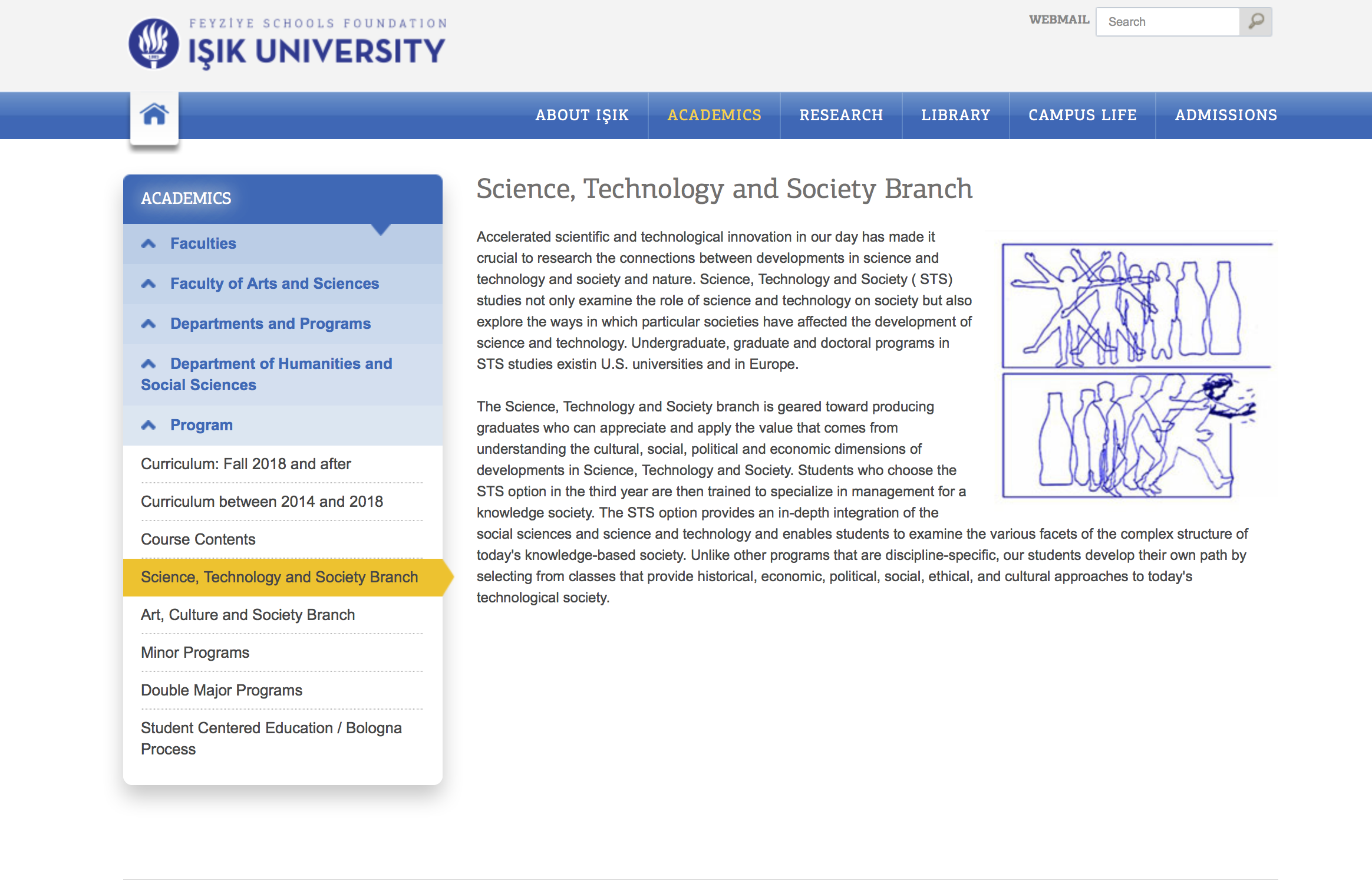STS Program @ Işık University
STS has yet to be institutionalized as an educational undergraduate program in Turkey, given that it is still not recognized by the Higher Education Council. In such a context, Işık University has been the first private university in Turkey to offer a substantial number and range of STS courses through the "Science, Technology, and Society" branch at the Department of the Humanities and Social Sciences.
The decision to open the STS program originated in 2005, with the strategic plan of the university prepared during the presidency of Prof. Dr. Ersin Kalaycıoğlu. Upon this idea, the Prof. Önder Pekcan, who was the dean of Faculty of Arts and Sciences at the time, suggested Prof. Dr. Hacer Ansal as the person for this job (and his former colleague from ITU), based on her role in the ITU STS Program. Hacer Ansal left her job at ITU for Işık, with the aim of starting an undergraduate program of STS. However, as the program she prepared was being discussed in the university senate, the idea that STS was not a well-known field in Turkey and it would be more appropriate to have it as a branch under a more general Humanities and Social Sciences department prevailed. The program was revised accordingly and started to accept students in 2007.
Thus, from its beginning, the Humanities and Social Sciences department had the vision to divide its students into two programs (or branches, as the school calls them) after the first two years: Art, Culture and Society; and Science, Technology, and Society. This structure continued until 2018, when the department decided it is no longer viable to have two programs with a decreasing number of students, and merged them. Under the new program, core courses for both previous programs became departmental electives, but the content and variety of the courses remained the same. The old curriculum still applies to students who came to the department previous to 2018.
Before it was closed, this was the description provided on the department web page for the STS branch:
Science, Technology and Society Branch
Accelerated scientific and technological innovation in our day has made it crucial to research the connections between developments in science and technology and society and nature. Science, Technology, and Society ( STS) studies not only examine the role of science and technology on society but also explore the ways in which particular societies have affected the development of science and technology. Undergraduate, graduate and doctoral programs in STS studies exist in U.S. universities and in Europe.
The Science, Technology, and Society branch is geared toward producing graduates who can appreciate and apply the value that comes from understanding the cultural, social, political and economic dimensions of developments in Science, Technology, and Society. Students who choose the STS option in the third year are then trained to specialize in management for a knowledge society. The STS option provides an in-depth integration of the social sciences and science and technology and enables students to examine the various facets of the complex structure of today's knowledge-based society. Unlike other programs that are discipline-specific, our students develop their own path by selecting from classes that provide historical, economic, political, social, ethical, and cultural approaches to today's technological society.

Some of the courses that are listed under the STS curriculum are as follows:
Technological Change, Popular Culture, and Media
History of Computing
Science, Technology and Contemporary Art
Environment, Technology, and Society
Human Dimensions of Biotechnologies
Technology and Work
National Innovation Systems and Competitiveness
Science and Technology in Movies
Communication, Technology, and Society
Ethics and Biotechnology
Knowledge and Knowledge Management in the Information Age
Strategic Management of Technology
Innovation Management
Humanities and Social Sciences students are required to prepare a senior thesis as part of their requirement for graduation. During the ten years that it was open, students who chose the STS program did the same according to their research interests and with guidance from professors who also work in the STS field that included Hacer Ansal, Maral Erol, and Umut Ekmekçi. The titles from these theses give us a clue for what was seen as important or interesting in the ten year period in terms of STS in Turkey:
Ecek, Abdullah (2017). Ethical Concerns About Eugenics and Human Enhancement Under Human Genome Project.
Tatlı, Büşra (2017). Does Social Media Affect Privacy of Women and Men Differently?
Atalay, Umut (2016). Difficulties and Challenges of the Video Game Industry in Turkey.
Hizal, Nurşah (2016). The Role of Government in Fostering Innovation.
Kardeş, Büşra (2016). Innovation Performance of Turkey According to Global Innovation Index.
Akyürekli, Burcu (2015). Importance of Frugal Innovation for Developing Countries.
Çakmak, Çağla (2015). Interrelation Between Social Media and Democracy.
Çevik, Damla (2015). The Age of Big Data: Sector Analysis in Turkey.
Kayaalp, Pelin (2015). Reasons Behind the Increasing Fatality Rate of Subcontracted Workers in Turkey.
Berbe, Dilanur (2014). Patents in the Pharmaceutical Industry in Turkey.
Bozgaca, Gözde (2014). The Role of Organisational Culture on Creativity.
Can, Cengiz (2013). The Students Usage of Facebook at Işık University.
Erdöl, Gökçe (2012). Role of Trust in Strategic Alliance.
Gülaydın, Kutay (2012). Factors that Affect Internationalization: The Case of Turkish Automotive Ancillary Sector.
Torun, Burcu (2012). Design in Innovation Process.
Vur, Cem’i (2012). Factors Affecting the Diffusion of Bioplastics in Turkey.
Güney, Sedef (2011). How to Generate An Innovative Organization.
You can reach the selected project abstracts from here.
Maral Erol, "STS @ IŞIK UNIVERSITY", contributed by Duygu Kasdogan, STS Infrastructures, Platform for Experimental Collaborative Ethnography, last modified 16 August 2018, accessed 28 January 2025. https://stsinfrastructures.org/content/sts-işik-university
Critical Commentary
A text about the STS undergraduate program (2007 - 2018) at Işık University, Istanbul.